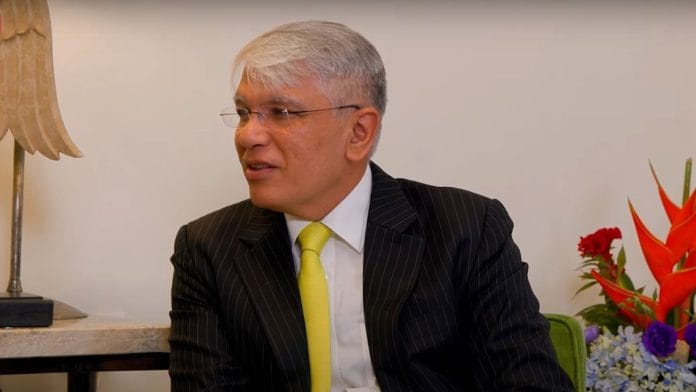New Delhi: Welfarism that is financed with debt burdens the state with long-term detrimental effects on the economy and future generations, said Manish Sabharwal, Vice-chairman of staffing solutions and human capital firm, TeamLease, adding that tax-financed welfare initiatives are more sustainable and responsible.
Speaking to journalist and author Vir Sanghvi for ThePrint Dialogues, Sabharwal discussed how welfarism has historically been perceived in India, its consequences and the transformation the system requires. He pointed out that state governments in India have been fiscally irresponsible over the past few years, creating trouble for future generations.
“How you finance the welfare state is really important. If you finance it through debt, you’re essentially being a bad ancestor,” said Sabharwal.
“If you finance it through taxes like Sweden, Norway, and Finland — they are second, third and fourth, or third, fourth and fifth in the world in terms of government spending as a share of GDP. But they are also five, six and seven in ease of doing business, which means that they finance their welfare state through taxes rather than debt,” he added.
Sabharwal highlighted that political leaders across the country, for the sake of winning elections, make big welfare-related promises without a proper plan to fund them. He emphasised that the objective of welfare schemes should be to support people in the bottom layers of society.
In a previous interview to ThePrint, Surjit Bhalla, former executive director at the International Monetary Fund (IMF) and former member of the Prime Minister’s Economic Advisory Council, had also pointed out that the government’s welfare schemes should target those in acute poverty rather than two-thirds of the country’s population.
The election season saw a huge debate between the BJP-led National Democratic Alliance (NDA) and Opposition INDIA bloc on ‘revdi‘ schemes, involving freebies to certain sections of the society. These schemes included free electricity, free midday meals in state government schools for children, free bus rides for women, etc.
Sabharwal pointed out that welfarism could not be a substitute for job creation. He noted that this sentiment has been echoed by voters across states like Andhra Pradesh, Odisha and Punjab.
“Welfarism has to be a safety net; you can’t hang out on it. It can’t become a hammock,” he remarked.
Also Read: PM’s economic advisor asks if India needs a new poverty line, says multidimensional index not enough
‘No one wants to take responsibility’
According to Sabharwal, there is an increasing trend of political leaders being unwilling to take responsibility for their actions.
He said that in the past 5-10 years, politicians have consciously made promises at the state government level that they would not be around to pay the bill for.
He recalled a banking crisis — where a banker, aware of the impending losses from selling bad derivatives to an Indian corporate, had dismissed concerns about future problems with the phrase, “I’ll be gone, you’ll be gone” — highlighting a pervasive issue in both politics and finance.
Populist leaders especially, he told ThePrint, often promise extensive welfare benefits to win votes without considering the long-term financial implications.
“Welfarism must not be commoditised; rather, smarter fiscal decisions should be taken to ensure the eradication of poverty and economic growth for India,” Sabharwal said.
The private-public sector divide
A lot of India’s failure in economic growth could be pegged on the lack of cooperation between the private sector, government and non profits, Sabharwal said.
“The private sector has a trust deficit, the government has an execution deficit, and non profits have a scale deficit,” he added.
Referring to the historical 1991 economic reforms (liberalisation, privatisation and globalisation), Sabharwal remarked that India has not really transformed in terms of formalisation, industrialisation and urbanisation. He gave the example of how more than 2 lakh villages in India still have less than 200 people.
“The 63 million enterprises only transforming into 25,000 companies is a child of informality, and informality is the slavery of the 21st century,” said Sabharwal, describing how lack of formalisation is affecting India’s economy.
Another reason he pointed out was the lack of training of human capital. Only education could solve that, he said.
Sabharwal advocated the need for welfarism in India to help the poor and aid their upliftment, but he clarified that it could not be a substitute for formalisation, urbanisation, industrialisation, financialisation and human capital.
While welfarism is important for social growth, it is majorly the private sector and the country’s human resources that can truly bring about transformative economic progress, he told ThePrint.
“One of the reasons that India is poor — we don’t have to be — is the lack of teamwork among the private sector, government and non profits to recognise we all have our own swim lanes, we all have our birth defects, but India is really going to only be powerful if we all work together,” Sabharwal added.
(Edited by Mannat Chugh)







Manish Sabarwal saab, what is the size of your Salary Cheque, and what amount of subsidy on all goods and services you purchase and what are the perks you enjoy from Tax payers money? Your office is cool with 1.5 tonne A/c , a large mahogany Table and adjustable cushy cusy chair are these not freebies you enjoy plus that pass to exclusive club for officer and many dinners? Freebees uh given for making ridiculous statement you make ?